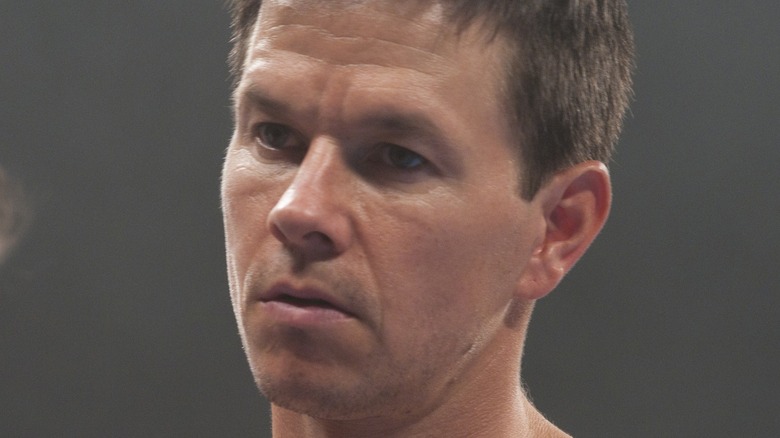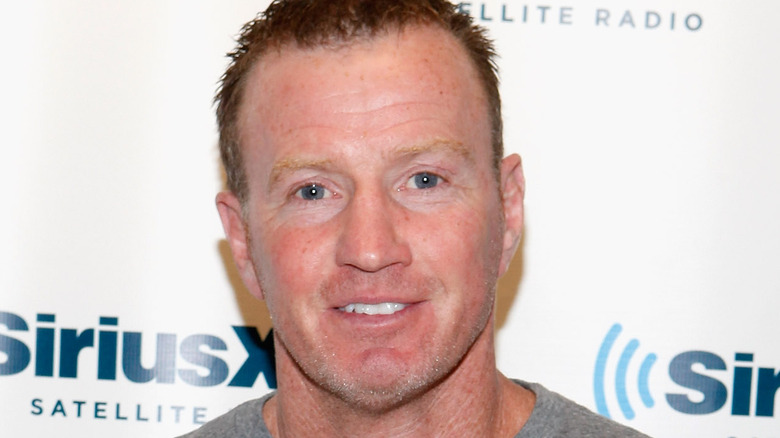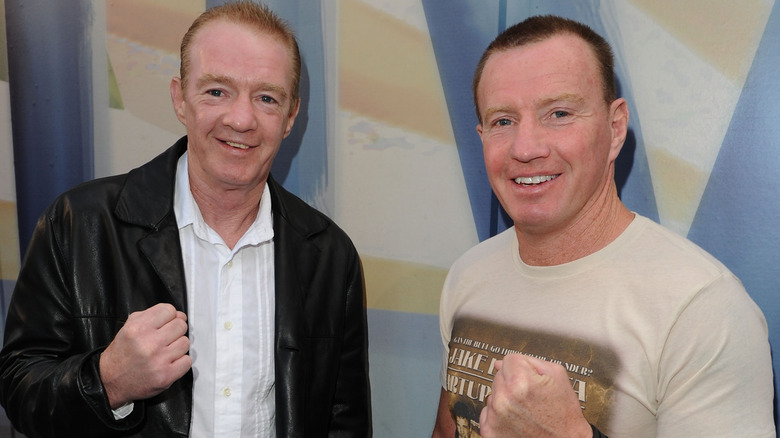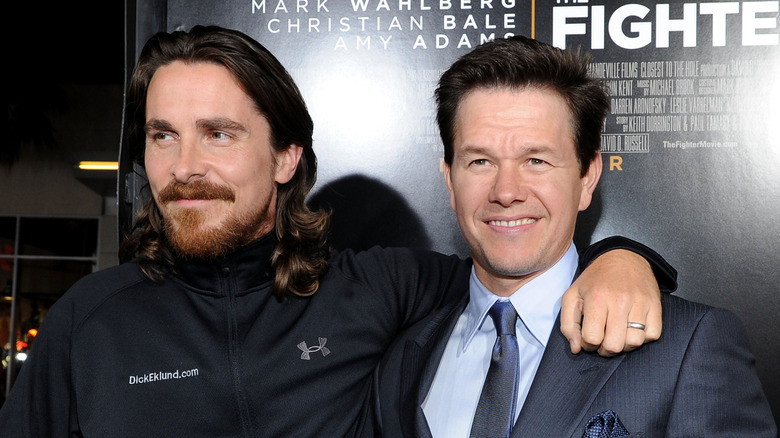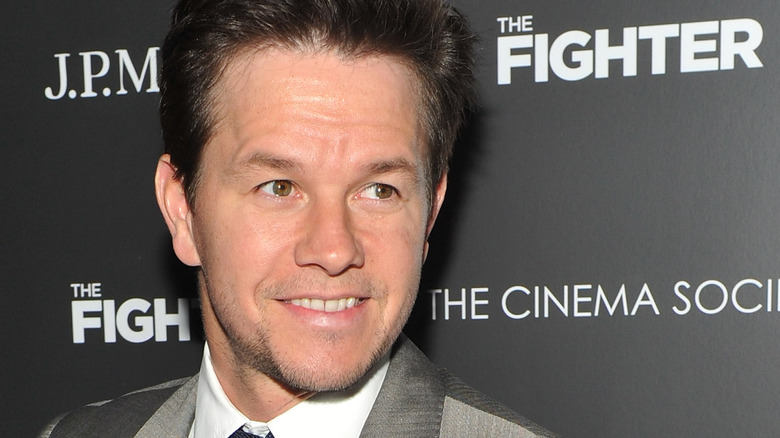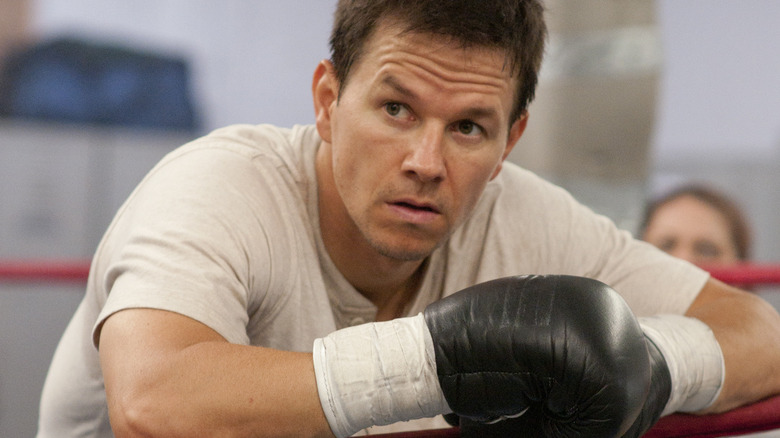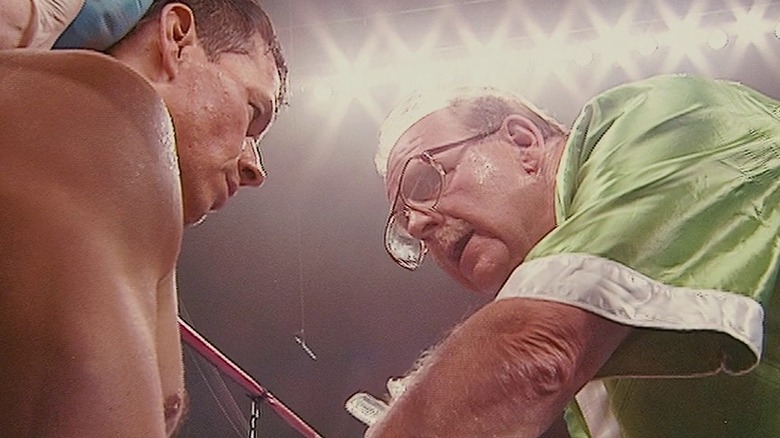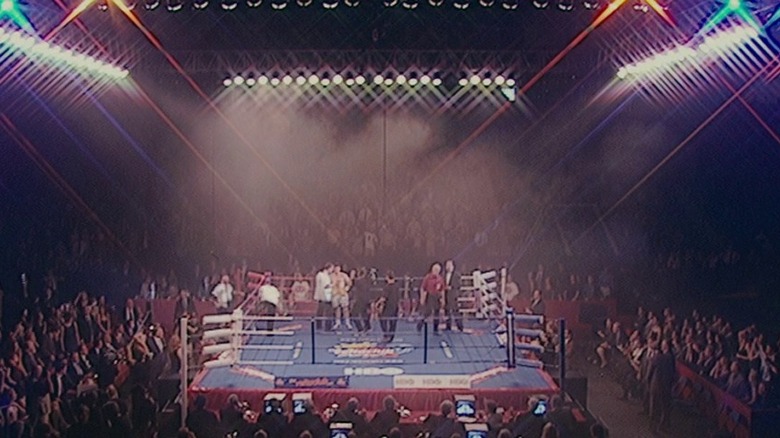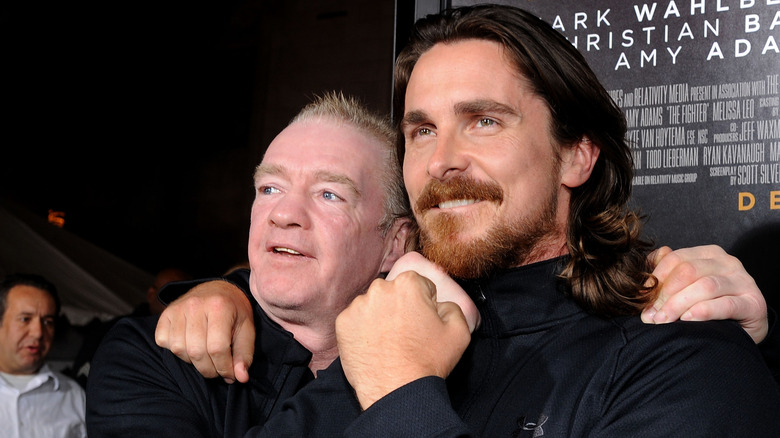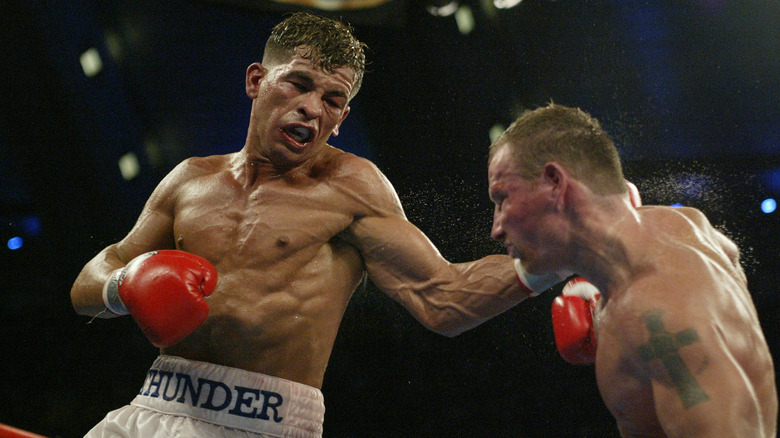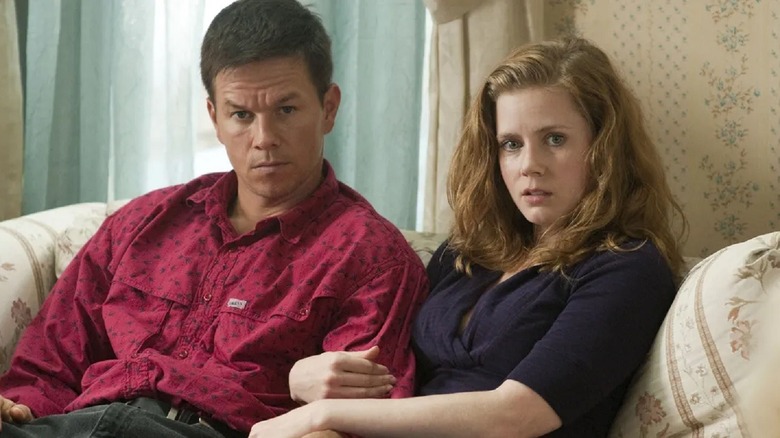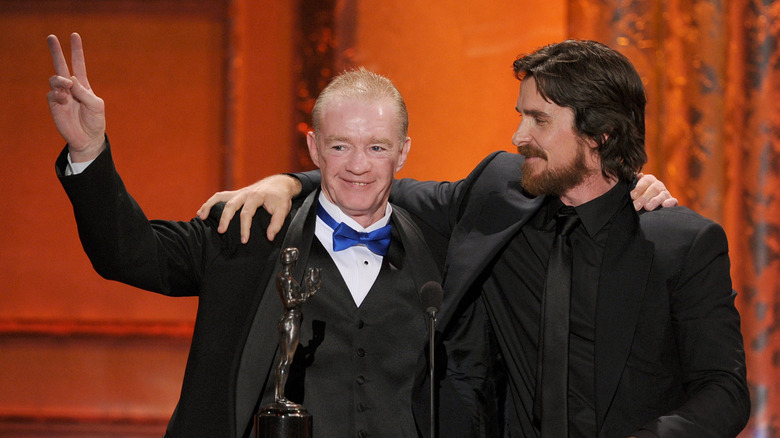The Untold Truth Of The Fighter
Director David O. Russell's "The Fighter" explores the true story of two half-brothers from Lowell, Massachusetts, and their divergent paths in life (via IMDB). "Irish" Micky Ward (Mark Wahlberg) grew up in the shadow of his talented but troubled older brother Robert "Dicky" Eklund (Christian Bale). Dicky was once a promising professional boxer known as "The Pride of Lowell," whose aspirations to become a champion were destroyed by his well-documented struggles with crack addiction (via Lowell Sun).
Despite his personal struggles, Dicky trains his younger brother, Micky, who has boxing aspirations of his own. When Micky's new girlfriend, Charlene (Amy Adams), suggests that his family's influence might hold him back from realizing his potential, Micky struggles to establish boundaries to foster his ambitions. The film weaves the story of a once prosperous textile manufacturing hub fallen on hard times with the families living in a community blighted by poverty, crime, and addiction. "The Fighter" is as much about toxic family dynamics, familial love, and loyalty as Micky's drive to overcome his life circumstances to become a boxing champion.
Ward told The Guardian, "It's not really a boxing movie anyway. The boxing's the backdrop, but it's more about family dynamics, it's about the struggles of two brothers ..." The road from script to screen was long and arduous. Just like Ward, this film overcame roadblocks and setbacks, ultimately finding recognition as an Oscar nominee. Keep reading to discover the untold truth of "The Fighter."
Micky Ward didn't own the rights to his life story
After Mark Wahlberg contacted Micky Ward about making a movie about his life, Ward discovered he didn't own the rights to his life story when he received cease-and-desist letters from Scout Productions (per Irish Times). Ward had sold those rights for $1,000 in May 2003, believing he was signing paperwork about appearing in another documentary featuring his half-brother Dicky Eklund. Ward told the Irish Times, "I signed it to get Dicky out of my hair. I was training for the (third) Gatti fight and I didn't want to deal with it."
Mark Wahlberg told Deadline he loves boxing movies and had been trying to make one for a while, saying, "I first met Micky when I was 18 years old, and was a huge fan. I thought, this is the movie I should make. John Herzfeld and I went to Lowell to see Micky and Dicky and talk about the possibility. We found they'd already sold the rights 10 times over ... it seemed there was no way we'd be able to sort it out."
As reported by Men's Journal, in a 2003 lawsuit, Ward claimed Eklund tricked him into signing away the story rights, while Eklund maintained the production company tricked him. Ward settled the lawsuit with the production company under a confidentiality agreement a few months later and signed a new contract with Paramount. Wahlberg joined the project a few years later after reviewing a script from Brad Weston.
Micky Ward and Dicky Eklund worked as consultants on the film
The brothers moved into Mark Wahlberg's Los Angeles house for a few weeks and worked with the lead actors on their boxing after they had both signed on to star in "The Fighter." Micky Ward told The Guardian, "I went over and stayed with Mark [in California] for a few weeks at a time. And three or four times he came to hang out here. He wanted to train like I did, come running with me, or he'd want to just talk and get to know me ... I guess he was studying me as we talked and whatever, watching my mannerisms without me even knowing it." Ward told WBUR the brothers were offered cameos in the film, but Dicky Eklund didn't take to direction, so the acting opportunity didn't work out.
As reported by Men's Journal, Paramount paid Eklund $193,000 for rights to his life story and for participating as a consultant. Christian Bale told Men's Journal, "I had a notebook full of Dickyese," Eklund's idiosyncratic slang. "I would take it with me every day to the set, and I had Dicky there in case I needed more." In an interview with Kevin McCarthy, Bale discussed how he prepared for the role, spending time with Eklund in California and visiting with him in Lowell, "going around to all his old haunts. Going to bars, going to the crack houses that he used to hang out in."
Different actors and directors were originally attached to the project
Mark Wahlberg signed on to play Micky Ward in 2006 after Paramount purchased the rights. As Wahlberg told Deadline, "Then we went from one co-star to another, different writers, directors, the whole thing." Initially, Boston native Matt Damon signed on to play Dicky Eklund, but as reported by Variety in 2007, he had to drop out of the film because he was juggling too many projects. Brad Pitt joined the project in 2007, replacing Damon as Eklund in the film.
According to The Playlist, in July 2008, Wahlberg said "The Fighter" would start filming in the fall. When October rolled around, director Darren Aronofsky reported casting issues, telling The Playlist, "Brad's not involved. ... We'll see what happens." After Pitt left the project, Aronofsky also exited, with some saying Aronofsky's success with "The Wrestler" made his interest in "The Fighter" dwindle, possibly seeing it as superfluous (per New Yorker).
Wahlberg then tried to keep his promise to Ward that they would make the movie. Wahlberg told Deadline, "I went to the studio and said, I think I can figure out a way to get this movie done. Can you let me take [it] for a little while, and then bring it back to you? They entrusted me with that." As reported by the New Yorker, Wahlberg brought on David O. Russell, who had directed Wahlberg in "Three Kings," and they cast Christian Bale as Eklund, saving the project.
Mark Wahlberg became a producer to save the project
"The Fighter" turned into a passion project for Mark Wahlberg. After Aronofsky and Pitt dropped out, Wahlberg signed on as a producer, seeing the project through the switch from a big-budget studio picture to an indie film (per Deadline). At a press conference covered by Collider, Wahlberg talked about how he became a producer, saying, "It was just out of sheer desperation for getting the movie made. I had already promised Micky, Dicky, Alice, Charlene and everybody else involved that we were going to get this movie made and it seemed at first glance like it was a no brainer."
As Wahlberg shared with Deadline, he felt a personal connection to the story, partly because he grew up just on the other side of Boston from Lowell. Like Micky Ward, Wahlberg is the youngest of nine children and also grew up in the shadow of his successful older brother, Donnie. Wahlberg saw many parallels between his life and Ward's life but also related to Dicky Eklund, telling Collider, "I mean, I was in a lot of trouble and then I turned my life around."
Wahlberg's dedication to "The Fighter" paid off. The film was nominated for seven Oscars, with Melissa Leo and Christian Bale winning for their supporting roles (via IMDB). Despite not being nominated for his performance, Wahlberg was proud of the movie, telling Deadline he thought they made "the best possible version of the movie."
Mark Wahlberg trained in boxing for years
Mark Wahlberg began training for the role years before it was filmed. After reading the script, Wahlberg built a boxing ring in his backyard, telling Deadline, "I started training the day I got back from vacation." He continued training through all the delays and while filming other movies. For years, Wahlberg wanted to make a boxing movie and dedicated himself to this endeavor, telling Deadline, "I had to play Micky. Dicky was a flashier role, but it wasn't about that for me. It was about being believable as a guy who could win the welterweight title, and not look like an actor who could maybe box a little bit."
Wahlberg had his own trainers, which he reportedly paid for out of his own pocket. He also trained with Micky Ward in his backyard when Ward and Eklund flew out from Lowell to work with the actors. Ward told The Guardian, "He could be a decent fighter," and when asked if Ward could beat Wahlberg, Ward replied, "I hope I could, but he's a lot bigger than me!" When asked at a press conference about his confidence in the boxing ring, Wahlberg told Collider, "Well the movie was a go and then it fell apart and I just continued to train so after 3-1/2 years I felt confident enough to go in there and be believable as a boxer who could possibly win the welterweight title."
Mickey O'Keefe plays himself in the film
Mark Wahlberg was instrumental in casting the film. As reported by Deadline, Wahlberg suggested Melissa Leo play Alice Ward, convinced Christian Bale to join, and wanted Mickey O'Keefe to play himself. Although O'Keefe was hesitant, he auditioned and got the part. Wahlberg told Deadline, "If we'd cast an actor, we'd have one more person who'd only been around a boxing ring a couple of weeks. I needed the real guy. ... He ended up being so good in his performance, because he is real."
Like in the film, O'Keefe was a police officer. He had known the brothers their whole lives and saw something in Ward. O'Keefe told The Boston Globe that it was enjoyable training Ward, saying, "Micky always did a little extra. He never stopped, never quit. I remember we were in the gym one Saturday in the summer. It was 100-something degrees. I said, 'Look around — it's just you and me. That movie 'Rocky' is not real. You're real.”'
O'Keefe was a youth boxing champ before joining the military and later becoming a police officer. He opened a boxing gym in Lowell during his recovery from alcohol abuse (per Daily News). The gym gave O'Keefe something to focus on in his new sobriety, and it gave local kids somewhere to hang out, use their energy productively, and stay out of trouble. The production used O'Keefe's gym as a filming location (per The Boston Globe).
All fights were filmed in the first few days of shooting
From the beginning, Mark Wahlberg was committed to making a realistic boxing movie. Not only did he train for years, but Wahlberg also convinced director David O. Russell to shoot the film's fights with techniques HBO uses for live fights. Wahlberg used his connections as a producer to partner with HBO, capturing the authenticity of professional boxing in "The Fighter." Wahlberg told Yahoo Entertainment in an interview, "So we got the actual cameras, the actual director that shot [Ward's famous trilogy of fights against rival Arturo Gatti]. HBO gave us all their equipment and everything. They came and we just shot them in sequence."
Wahlberg told Deadline, "Some directors we talked to about doing the movie said, there's no way you can do this in 33 days, you'll need 30 days just to shoot the fights. I'm like, what are we going to do for 30 days?" They hired professional fighters to go toe-to-toe with Wahlberg, and all the fight sequences were shot during three 12-hour days at the beginning of the production before shooting on location in Lowell. Wahlberg credited the speed and efficiency of shooting the fights to the crew borrowed from HBO sports productions and the professional fighters, telling Deadline, "I thought we could do those fights in a day or two but added a day to be safe. We got it done in those three days."
Dicky Eklund initially hated The Fighter
Although Dicky Eklund was a consultant and worked generously with Christian Bale, Eklund had some issues with the film. Bale told Men's Journal how angry Eklund was while reading the script, "He said, 'I done a lot worse than what you guys are showing. But do you guys have to show my sisters and mother this way?' He was always more concerned about them than himself."
Micky Ward was pleased with the biopic, but he told The Guardian that Eklund hated the movie when they watched the first screening at Paramount. Ward said Eklund complained, "it made me look like a million bucks and him look like a two-dollar bill. He didn't like it seeing all the drugs stuff, it brought him back to that time." Eklund's poor reaction led Bale to arrange a public screening in New Jersey. After seeing how audiences reacted, Dicky's opinion changed. Realizing how moved people were by Eklund's life story and Bale's phenomenal performance gave Eklund satisfaction, making him feel his experiences and struggles were worth it.
Bale's extreme transformations for his roles are regarded with wonder and respect, but his performance as Eklund was eerily perfect. Ward told Men's Journal, "Christian is more Dicky than Dicky." The Academy agreed, and Bale won an Oscar for his performance. From the interviews, it's clear Bale enjoyed getting to know Eklund, and Bale gave credit to Eklund's cooperation for his successful performance.
Mark Wahlberg and Micky Ward wanted to make a sequel
Starting as early as 2011, Mark Wahlberg and Micky Ward both expressed interest in making a sequel to "The Fighter." The film would follow the trio of legendary fights between Arturo Gatti and Ward before his 2003 retirement. These bouts were nominated as "Fight of the Year" three years in a row and sent both boxers to the hospital (per The Guardian). Ward and Gatti cultivated a "warm friendship," leading to Gatti bringing Ward on as a trainer to prepare for his last professional match (via SFGate). They stayed in touch until Gatti's suspicious death in 2009.
In 2019, Wahlberg told Entertainment Weekly, "I'm trying to plant the idea in everyone's head that we should do — not five or six 'Fighters' like 'Rocky' — but one more because the big thing that Micky Ward was famous for was his three epic battles with Arturo Gatti. So we're talking about possibly taking one more run at it." Nothing materialized despite Wahlberg and Ward's enthusiasm about the potential project.
More than a decade after its release, "The Fighter" is still on Wahlberg's mind. In a 2022 interview with Screen Rant, Wahlberg shared how despite being too old to play Ward himself, he's still interested in telling the story, saying, "If the audience really wants it, and they really love it, and we can make one better than the first then I'd be willing to do it again, for sure."
The Fighter is based on a true story, but employs dramatic license
"The Fighter" took liberties to ramp up the drama and condense several years into two hours. The story of the brother's relationship and Dicky Eklund's troubles are accurately depicted. However, Micky Ward's fight record was slightly altered for dramatic tension. In reality, Ward wasn't on a losing streak before fighting Mike Mungin, and the boxers' weight difference was less than depicted in the movie, according to The Cinemaholic. The film also condenses Ward's road to the title bout in London. In the film, Ward beats Sanchez, immediately advancing to a title bout. In reality, after beating Sanchez, Ward fought six matches over nearly three years before the title fight with Shea Neary (per Box Rec).
The relationship between Ward and Charlene showcases another difference between reality and the film. In the movie, Charlene met Ward just before his loss to Mungin, but they really met shortly before his title fight against Neary. Charlene's active role in helping Ward on his way to the title bout was also enhanced (per The Cinemaholic).
The final difference between the film and real life is how long Eklund was in jail before training his brother for the title fight. As reported by the Daily News, Eklund served approximately four of an eight-year sentence. In the film, Eklund's son doesn't age while he is in jail, giving the impression that Eklund was in jail for only several months rather than years.
Eklund's legal and addiction struggles continued after release from prison
"The Fighter" ends on a high note with Micky Ward winning the welterweight title in London, with a sober Dicky Eklund acting as his brother's trainer. This Hollywood ending is accurate to what happened in the brothers' lives, but life kept moving after the credits rolled. According to Men's Journal, Eklund's addiction and arrests that were explored in the HBO documentary "High on Crack Street: Lost Lives in Lowell" continued after the time depicted in the film.
Eklund was arrested over 65 times in his life. Most were before his four-year prison stint, but some were after he was released from prison. As reported by Men's Journal, Eklund has been arrested for possession, assault, and even attempted murder. The Boston Globe reported in 2015 that Eklund was arrested for domestic assault, and according to Men's Journal, this wasn't the first time.
Although "The Fighter" depicts Eklund's release from prison as the return of a reformed man, Eklund is the first to admit that his sobriety is a work in progress, and he is taking life one day at a time. Eklund told Men's Journal, "I don't like when people – whether you're clean one day or 10 years – are down on people who are partying, because you can be back there tonight. One slip, you can be back there. Worry about yourself; you can't help nobody else."
If you or someone you know is dealing with domestic abuse, you can call the National Domestic Violence Hotline at 1−800−799−7233. You can also find more information, resources, and support on their website.
If you or anyone you know is struggling with addiction issues, help is available. Visit the Substance Abuse and Mental Health Services Administration website or contact SAMHSA's National Helpline at 1-800-662-HELP (4357).
